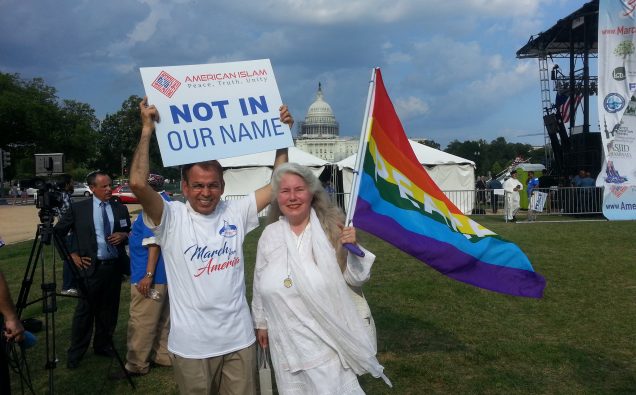
Majoritarian tyranny prevails where tribalism is dominant. And this can occur anywhere, underlying the necessity to not take the eye off the ball.
This was the core takeaway when I was asked by Professor Akbar Ahmed to address his Islam in Europe seminar at American University, Washington, DC. It lasted nearly 3 interactive hours.
At the outset, I mentioned their good fortune in being students of humanities, which would furnish requisite tools to analyze data, ascertain long-term repercussions of policies and actions, glean insights from history, and empathize with the less-privileged.
Particularly significant it is in an age of information-overload, exacerbated by rampant social media prone to falsify facts and feed misinformation.
Cited here are some key topics and issues around which discussion revolved, based on my travel experiences and exposure to Europe and elsewhere.
Embedded strategically in the European hinterland is the Muslim-majority country of Albania, just over a one-hour flight from Vienna and Rome. During the WWII period, it was invaded twice: once by Mussolini’s fascist Italian forces in 1939 and the other time, in 1943, by Hitler’s army. This was at a period when purely, from a humanitarian point, Europe was turning into a moral junkyard. Yet, the Albanian populace at great peril gave sanctuary to Jews, fulfilling its concept of “Besa” (promise to protect.) Having warded off the triple dose of Fascism, Nazism, and Communism, what endured was its Dervish ethos of bravery and compassion.
Ironically, British PM Boris Johnson – a key proponent of Brexit – himself has Turkish Muslim roots. His great grandfather was Ali Kemal Bey, journalist and Turkish government minister.
It was the 10th century Muslim traveler, ibn Fadlan, who provided the first eyewitness description of Viking life – a fact referenced in the Viking ship museum in Oslo, Norway, and the basis of the 1976 novel, “Eaters of the Dead,” by Michael Crichton, author of “Jurassic Park.” On July 22, 2011, Anders Breivik massacred 69, mainly Muslims, at a youth summer camp near Oslo to ‘defend’ Norway against ‘Islamic colonization.’
The shadow of tribal hate hovers over Europe. The Balkan butchery of Muslims in Bosnia (1992-1995) and the carnage in Kosovo (1998-1999) testify to that. In striking contrast, in 2015, the Slovenian Prime Minister launched in Ljubljana “1001 Muslim Inventions” Heritage Exhibition, which was a roaring success.
In Budapest, Hungary, the patron saint of the city has been the 16th century dervish Gul Baba, whose tomb was immaculately kept even during Communist times. In Vienna, Austria, there is a museum marking the thwarted Ottoman siege in 1683 of the city, which, among other things, introduced coffee into Europe and the baking of the croissant in the shape of the Muslim crescent.
Angela Merkel of Germany blazed a trail of decency and humanity when she displayed statesman-like breadth of heart and took a historic self-corrective step by opening Germany’s doors to over 1 million refugees at a time when European xenophobia was at a high.
Setbacks can be a stepping stone to comebacks. A master-class of leadership was shown by the 40-year-old Prime Minister of New Zealand, Jacinda Ardern, in the aftermath of the March 2019 massacre of Muslim worshippers by an Australian at two Christchurch mosques. She immediately rushed to the sites, donned a hijab, shared tears, and declared it to be an attack on New Zealand itself. Its message of inclusivity won hearts all over the world. Also, Jacinda followed through on her public pledge to rigorously tighten gun restrictions. She refused to utter the name of the killer so as to deprive him of the name recognition that mass slayers seek (and get in America.)
One simple low-tech step I suggested was inviting young Muslims and sharing supper together. Underscored was the importance of engaging, questioning facts, digging deep, and not swallowing at face value the agenda-driven imagery conveyed by mainstream media, academia, and policy elites.
Hate – when unleashed – has a knack to take an unintended trajectory.
The assault on the US Capitol on January 6 was a classic blowback example in that Vice President Mike Pence, who was practically a doormat for Trump’s xenophobic rhetoric and policies for 4 years, became a target of lynch-like mob fury, with frenzied calls to “hang Mike Pence.”
A silver lining in this once-in-a-century pandemic is that it forcibly thrusts self-questioning along with its self-corrective scope of rectifying one’s own bad decisions.
Yes, education is important. But education without seeing others’ pain as our own and minus the courage to speak ‘Haq’ is futile. The safe and easy choice is to pass retrospective condemnatory judgment on atrocities of yesteryears while turning a blind eye to burning injustices of today that roil Kashmir, Palestine, and the Rohingya.
The young American University students left an impression with their motivation and desire to act and get involved – a testament also to the enlightened mentoring by Professor Akbar Ahmed.
The storm unleashed by the pandemic and the Trump presidency may have given young Americans a keener awareness of the dangers of remaining docile. This can forge the common ground for a vigorous outreach to US Muslims, who also need to come out of their largely self-imposed insular shells.

















